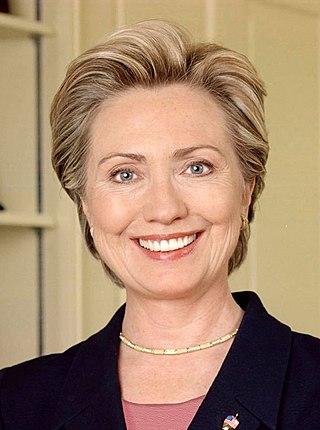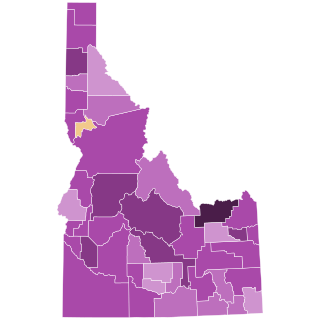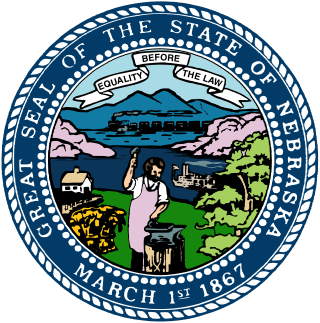In American politics, a superdelegate is a delegate to a presidential nominating convention who is seated automatically.

From January 3 to June 3, 2008, voters of the Democratic Party chose their nominee for president in the 2008 United States presidential election. Senator Barack Obama of Illinois was selected as the nominee, becoming the first African American to secure the presidential nomination of any major political party in the United States. However, due to a close race between Obama and Senator Hillary Clinton of New York, the contest remained competitive for longer than expected; neither candidate received enough pledged delegates from state primaries and caucuses to achieve a majority, without endorsements from unpledged delegates (superdelegates).

The 2008 Iowa Democratic presidential caucus occurred on January 3, and was the state caucuses of the Iowa Democratic Party. It was the first election for the Democrats of the 2008 presidential election. Also referred to as "the First in the Nation Caucus," it was the first election of the primary season on both the Democratic and Republican sides. Of the eight major Democratic presidential candidates, then-U.S. Senator Barack Obama of Illinois received the most votes and was ultimately declared the winner of the Iowa Democratic Caucus of 2008, making him the first African American to win the caucus and the first African American to win a primary state since Jesse Jackson in 1988. Former U.S. Senator John Edwards of North Carolina came in second place and then-U.S. Senator Hillary Clinton of New York finished third, though Clinton received more delegates than Edwards. Campaigning had begun as early as two years before the event.
The results of the 2008 Democratic Party presidential primaries are the detailed outcomes of a series of contests by which members of the United States Democratic Party chose their candidate for the 2008 U.S. presidential election. The contests are held in each of the fifty U.S. states, as well as the District of Columbia, Puerto Rico, American Samoa, Guam, the U.S. Virgin Islands, and Democrats Abroad. The Northern Mariana Islands was the lone U.S. state or territory which did not have a primary or caucus election in 2008. The outcomes include totals of delegates selected as well as popular votes.

The 2008 United States presidential election in Iowa took place on November 4, 2008, as part of the 2008 United States presidential election. Voters chose seven representatives, or electors to the Electoral College, who voted for president and vice president.

The 2008 Nevada Democratic presidential caucuses took place on January 19, 2008 after having been moved from a later date by the Nevada Democratic Party. The Nevada Democratic Caucus was considered important in determining the eventual party nominee, as many described it as the "Bellwether of the West" seeing as how it is the first Western state to vote in the Democratic Presidential Primary season.

The 2008 Florida Democratic presidential primary took place on January 29, 2008. Originally, the state had 185 delegates up for grabs that were to be awarded in the following way: 121 delegates were to be awarded based on the winner in each of Florida's 25 congressional districts while an additional 64 delegates were to be awarded to the statewide winner. Twenty-five unpledged delegates, known as superdelegates, were initially able to cast their votes at the Democratic National Convention.

The 2008 Minnesota Democratic presidential caucuses took place on Super Tuesday, February 5, 2008 with 78 delegates at stake. The winner in each of Minnesota's eight congressional districts was awarded all of that district's delegates, totaling 47. Another 25 delegates were awarded to the statewide winner, Barack Obama. The 72 delegates represented Minnesota at the Democratic National Convention in Denver, Colorado. Sixteen other unpledged delegates, known as superdelegates, also attended the convention and cast their votes as well.

The 2008 Colorado Democratic presidential caucuses took place on Super Tuesday, February 5, 2008. As he did in every other state that held a caucus rather than a primary, Barack Obama won the caucus by a wide, two-to-one margin over Hillary Clinton.

The 2008 Alaska Democratic presidential caucuses took place Super Tuesday, February 5, 2008. This was the first time that Democrats in Alaska participated in Super Tuesday, and the large turnout forced at least one caucusing site to delay closing its doors far beyond the 6 p.m. deadline. The state had a total of 13 delegates at stake. Barack Obama won the Alaska Democratic Caucuses and secured 9 delegates to the Democratic National Convention while Hillary Clinton took 4 delegates. However, the caucus was non-binding, and Alaska's Democratic State Convention in May awarded Obama 10 pledged delegates.

The 2008 Idaho Democratic presidential caucuses were held on Super Tuesday, February 5, 2008, with 18 national delegates at stake. For the first time, caucuses were held in all 44 counties, all of them open caucuses organized at the county level rather than the precinct level.

The 2008 North Dakota Democratic presidential caucuses took place on February 5, 2008, one of the many Super Tuesday nominating contests held that day. Barack Obama won the caucuses, securing 8 out of 13 national delegates.

The 2008 Washington Democratic presidential caucuses were a series of events held by the Washington State Democratic Party to determine the delegates that the Party sent to the 2008 Democratic National Convention. Delegates were selected in a four-tier process that began with precinct caucuses, was further refined in legislative district caucuses and/or county conventions, concluded for some delegates in the congressional district caucuses, and finally concluded for the remaining delegates at the state convention.

The 2008 Nebraska Democratic presidential caucuses took place on February 9, 2008, where 24 of the state's 31 convention delegates were chosen. Like he did throughout many other states that held caucuses instead of primaries, Barack Obama won the Nebraska Democratic Caucus by more than a two-to-one margin of victory over Hillary Clinton. On May 13, 2008, the state also held a non-binding primary election which Obama also won but the margin of victory was considerably smaller.

The 2008 Hawaii Democratic presidential caucuses took place on February 19, 2008, with 20 pledged delegates at stake. The winner in each of Hawaii's two congressional districts was awarded all of that district's delegates, totaling 13. Another seven delegates were awarded to both candidates at the Hawaii Democratic Party State Convention on May 23–25, 2008. These 20 delegates represented Hawaii at the Democratic National Convention in Denver, Colorado. Nine other unpledged delegates, known as superdelegates, also attended the convention and cast their votes as well.

The 2008 Vermont Democratic presidential primary was an open primary that took place on March 4, 2008. Barack Obama won the primary, his only decisive win among the four March 4 contests. The primary determined the 15 pledged delegates that represented Vermont at the 2008 Democratic National Convention. The delegates were awarded to the candidates, Obama and Hillary Clinton, on a proportional basis. Vermont also sent 8 unpledged "superdelegates", to the convention not bound by the results of the primary.

The 2008 Texas Democratic presidential primary and caucuses were a series of events to determine the delegates that the Texas Democratic Party sent to the 2008 Democratic National Convention. Delegates were selected using results from two sources: the Texas Presidential Primary held on March 4 by the Secretary of State of Texas's office, and a series of caucus events held between March 4 and June 7 by the Texas Democratic Party. The indecisive results of Super Tuesday, and the fact that Texas had the largest number of delegates among the states remaining on the Democratic primary calendar, resulted in the Texas primary receiving significant attention from both the Hillary Clinton and Barack Obama campaigns.
This article is a collection of statewide public opinion polls that have been conducted relating to the February Democratic presidential primaries, 2008.

The 2008 United States presidential election in Washington took place on November 4, 2008, and was part of the 2008 United States presidential election. Voters chose 11 representatives, or electors to the Electoral College, who voted for president and vice president.

The 2016 Wyoming Democratic presidential caucuses were held on April 9 in the U.S. state of Wyoming, representing the first tier of the Wyoming Democratic Party's nomination contest for the 2016 presidential election. Only registered Democrats were allowed to participate in the closed precinct caucuses.

















